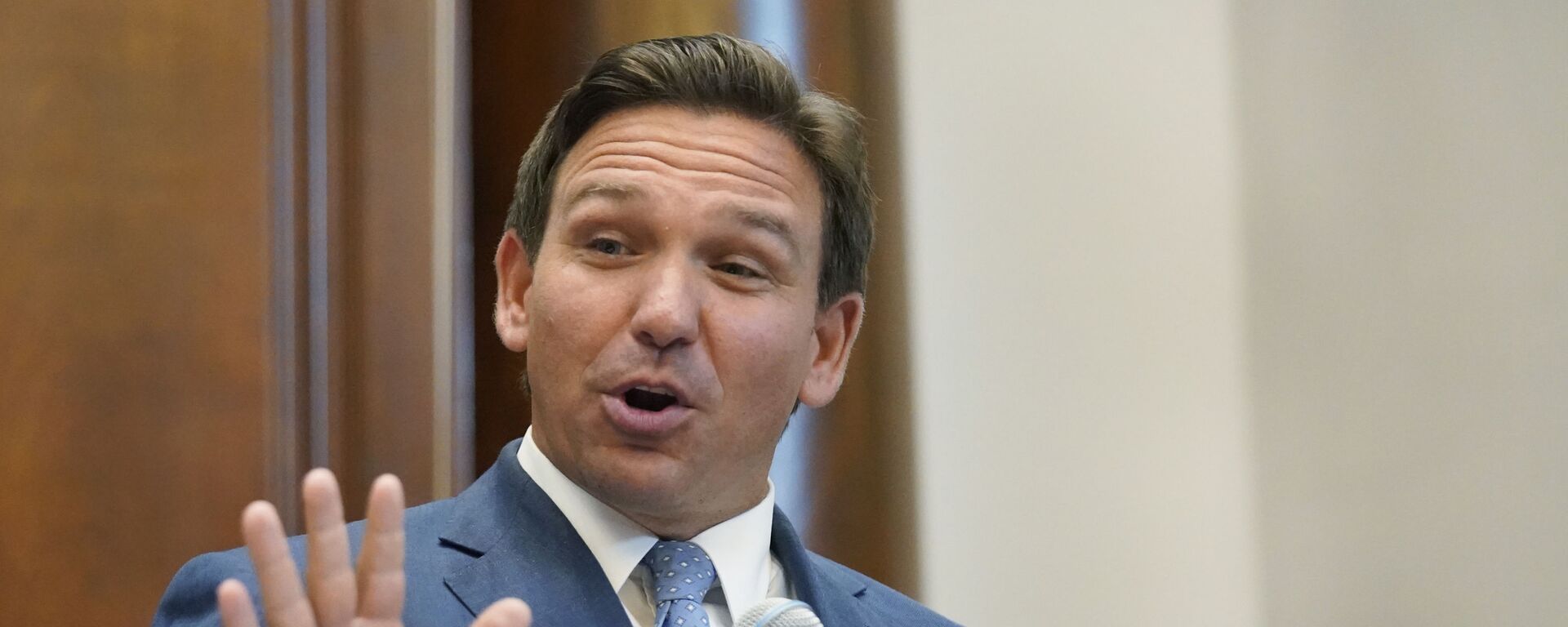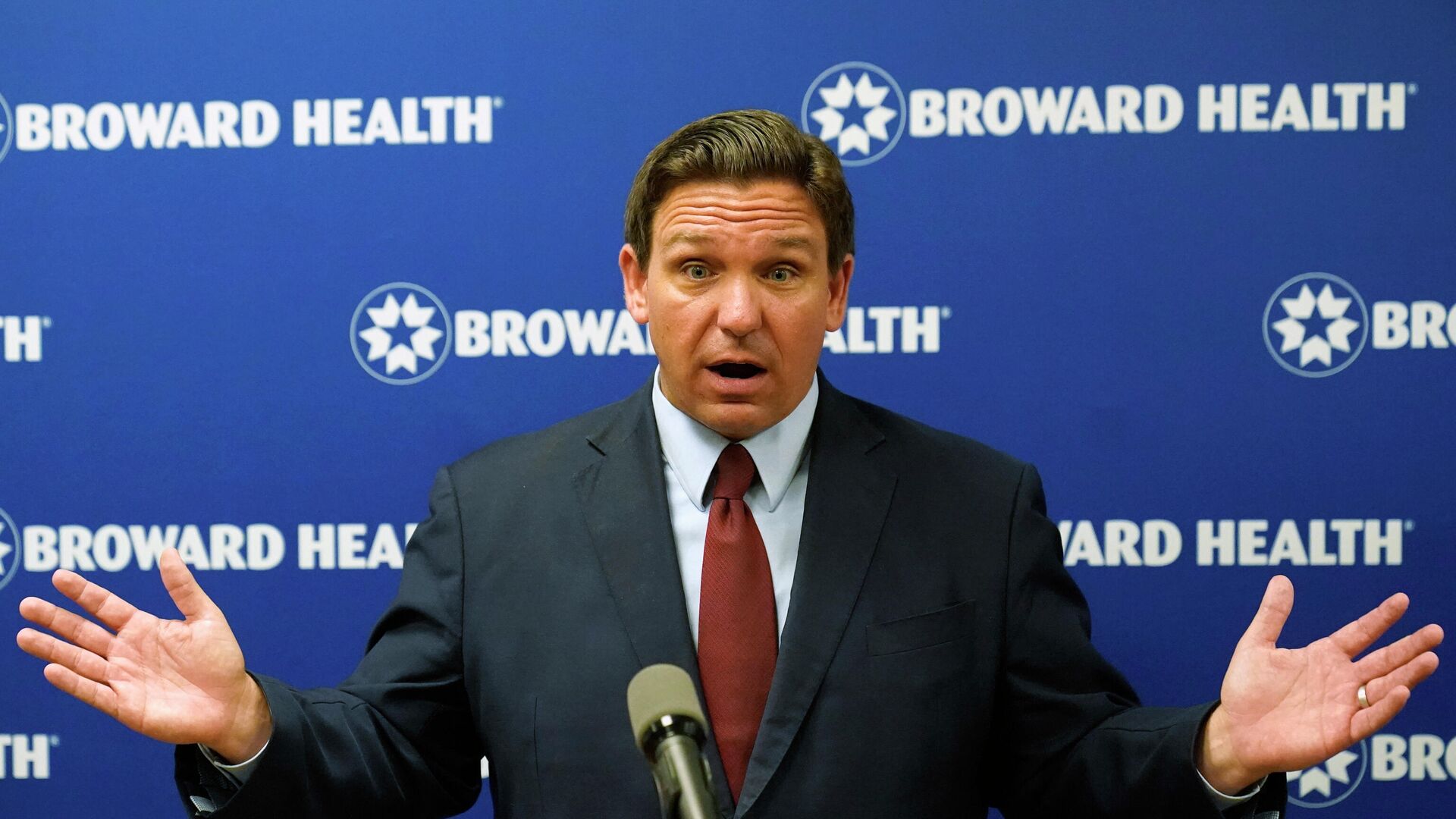https://sputnikglobe.com/20220109/floridas-desantis-says-wh-mainstream-media-hostile-to-him-over-therapies-to-treat-covid-19-1092139592.html
Florida's DeSantis Says WH, Mainstream Media 'Hostile' to Him Over Therapies to Treat COVID-19
Florida's DeSantis Says WH, Mainstream Media 'Hostile' to Him Over Therapies to Treat COVID-19
Sputnik International
Florida's conservative governor has long had strained relations with the federal authorities and mainstream media over his stance on the southern border crisis... 09.01.2022, Sputnik International
2022-01-09T21:22+0000
2022-01-09T21:22+0000
2022-01-09T21:22+0000
joe biden
us
vaccinations
anthony fauci
vaccines
ron desantis
covid-19
delta variant of covid-19
omicron strain
https://cdn1.img.sputnikglobe.com/img/07e6/01/09/1092140137_0:0:3072:1728_1920x0_80_0_0_bdb9c50d53d2ba307ede1f0e677c207b.jpg
Despite some of the relative successes of Republican Florida Governor Ron DeSantis in combating the COVID-19 pandemic, the Biden administration and much of the media remain hostile to Florida's way of coping with the virus, the governor believes.In an interview with Fox News' "Life, Liberty & Levin" on Sunday, DeSantis said that the constant assault of negative publicity and criticism from Washington is "all political." He claimed that he wears such a critique like a badge of honor, telling presenter Mark Levin that it is all "positive feedback."DeSantis explained that the state authorities reject critical race theory, promoted by the left, challenge the vaccine mandates imposed by the federal government, and fight against the flow of illegal immigration that has affected the state, "all those things that a vast majority of Floridians and Americans want to see done but that does threaten the ruling class and the regime." He then emphasized that he is genuinely working to provide Floridians with therapeutic choices such as monoclonal antibodies to complement White House-backed vaccines, while also allowing citizens to choose whether or not they want to be injected with the vaccines in the first place.According to the governor, when that happened, he contacted GlaxoSmithKline in Brentford, UK, to get sotrovimab medicines, in order to continue providing Floridians with the help against the novel coronavirus. When omicron strain emerged, DeSantis sought antibody treatment once more, and Biden's Health and Human Services department reportedly refused, figuratively saying: "'Oh, Florida, you use too much of it'," according to the governor.Biden continues to reiterate pro-vaccine platitudes and carry on the same way the feds have for months, the governor added, by neglecting the significance of examining, approving, and assisting states in obtaining treatment choices like the ones he supported.According to the Florida governor, this agenda is "about partisanship, and it's not about the best interests of the American people, when you talk about how these folks are acting."According to the latest Johns Hopkins University data, as of Sunday, January 9, the Sunshine State recorded a total of 4.6 million cases of COVID-19 with 62,688 deaths. Since the start of the vaccination campaign, more than 13.7 million residents have been fully vaccinated, which is about 65% of the total population. The state had more than 120,000 new cases of the virus as of Saturday, with a seven-day average increase of more than 58,000 infections.
https://sputnikglobe.com/20220104/us-politicians-flee-from-draconian-covid-policies-to-florida-to-enjoy-life-gov-desantis-jokes-1092015460.html
Sputnik International
feedback@sputniknews.com
+74956456601
MIA „Rossiya Segodnya“
2022
News
en_EN
Sputnik International
feedback@sputniknews.com
+74956456601
MIA „Rossiya Segodnya“
Sputnik International
feedback@sputniknews.com
+74956456601
MIA „Rossiya Segodnya“
joe biden, us, vaccinations, anthony fauci, vaccines, ron desantis, covid-19, delta variant of covid-19, omicron strain
joe biden, us, vaccinations, anthony fauci, vaccines, ron desantis, covid-19, delta variant of covid-19, omicron strain
Florida's DeSantis Says WH, Mainstream Media 'Hostile' to Him Over Therapies to Treat COVID-19
Kirill Kurevlev
Managing Editor
Florida's conservative governor has long had strained relations with the federal authorities and mainstream media over his stance on the southern border crisis and COVID-19 countermeasures, as Florida has remained open most of the time.
Despite some of the relative successes of Republican Florida Governor Ron DeSantis in combating the COVID-19 pandemic, the Biden administration and much of the media remain hostile to Florida's way of coping with the virus, the governor believes.
In an interview with Fox News'
"Life, Liberty & Levin" on Sunday, DeSantis said that the constant assault of negative publicity and criticism from Washington is "all political."
He claimed that he wears such a critique like a badge of honor, telling presenter Mark Levin that it is all "positive feedback."
"If the corporate press nationally isn't attacking me, then I'm probably not doing my job," he said. "So the fact that they are attacking me is a good indication that, you know what, I'm tackling the big issues."
DeSantis explained that the state authorities reject critical race theory, promoted by the left,
challenge the vaccine mandates imposed by the federal government, and
fight against the flow of illegal immigration that has affected the state, "all those things that a vast majority of Floridians and Americans
want to see done but that does threaten the ruling class and the regime."

4 January 2022, 14:04 GMT
He then emphasized that he is genuinely working to provide Floridians with therapeutic choices such as monoclonal antibodies to complement White House-backed vaccines, while also allowing citizens to choose whether or not they want to be injected with the vaccines in the first place.
"We set up these centers this summer when we started to see the delta variant rear its head, and it worked. We were keeping tens of thousands of people out of the hospital, saved thousands of lives. No one disputes that," DeSantis said of the monoclonal antibody treatment sites. "Well, as that was happening in September, the federal government decided to seize control of the monoclonal antibodies and cut supplies to Florida and Texas, mainly."
According to the governor, when that happened, he contacted GlaxoSmithKline in Brentford, UK, to get sotrovimab medicines, in order to continue providing Floridians with the help against the novel coronavirus.
When omicron strain emerged, DeSantis sought antibody treatment once more, and Biden's Health and Human Services department reportedly refused, figuratively saying: "'Oh, Florida, you use too much of it'," according to the governor.
"Well, part of the reason we use more than other states is because we've actually embraced treatment. Most of these other governors and the people like Fauci and the federal leadership, they basically say get a shot, wear a mask, and they never talk about treatment," he said.
Biden continues to reiterate pro-vaccine platitudes and carry on the same way the feds have for months, the governor added, by neglecting the significance of examining, approving, and assisting states in obtaining treatment choices like the ones he supported.
"I wish the vaccines were sterilizing, but they're not providing that type of an immunity," DeSantis explained. "So to just not deal with treatment and be hostile to people like me who are, it shows so much of this is about a political agenda."
According to the Florida governor, this agenda is "about partisanship, and it's not about the best interests of the American people, when you talk about how these folks
are acting."
According to the latest Johns Hopkins University
data, as of Sunday, January 9, the Sunshine State recorded a total of 4.6 million cases of COVID-19 with 62,688 deaths. Since the start of the vaccination campaign, more than 13.7 million residents have been fully vaccinated, which is about 65% of the total population.
The state
had more than 120,000 new cases of the virus as of Saturday, with a seven-day average increase of more than 58,000 infections.


